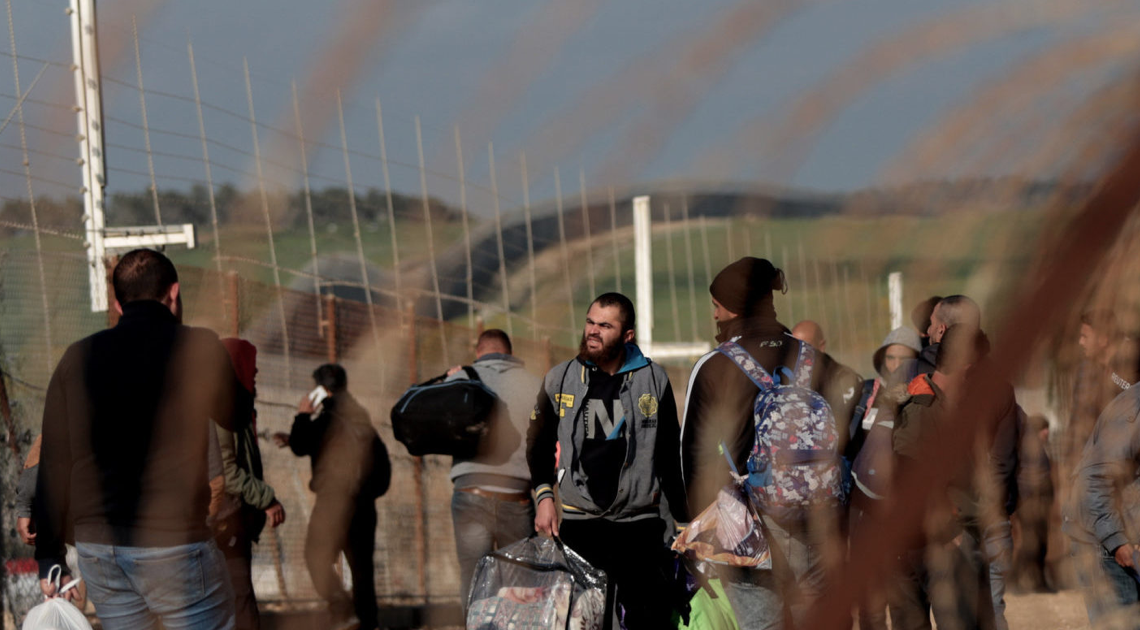 Palestinian workers try to enter Israel through a checkpoint between the West Bank city of Hebron and Beersheba, March 22, 2020. (Mamoun Wazwaz/Xinhua via Getty)
Palestinian workers try to enter Israel through a checkpoint between the West Bank city of Hebron and Beersheba, March 22, 2020. (Mamoun Wazwaz/Xinhua via Getty)
The man, whose image was circulated in a video on social media, was described as having a COVID-19 symptom
Palestinian and Israeli authorities denied that a sick Palestinian lying near an Israeli military checkpoint in the West Bank was infected with the novel coronavirus after a video of the man on social media said that he had difficulty breathing, one of the symptoms of COVID-19, the highly contagious illness caused by the virus.
Nablus Deputy Governor Anan Al-Athira told The Media Line that the man, who worked in construction in the Tel Aviv area, told Palestinian authorities that the Israeli police had taken him to a hospital and then left him near the Beit Sira checkpoint, without informing Palestinian officials in advance. The Palestinian ambulance crew did not arrive for some time because it was searching for him, she said.
“We found him unconscious, lying on the ground next to the street.” The way he was treated by Israel was “a war crime,” she charged.
The Israeli Police foreign press spokesman said the man had been taken to Tel Aviv Sourasky Medical Center for treatment and had been given a COVID-19 test that turned out negative.
The police escorted him to the Maccabim security crossing because he was an illegal worker, and “from there, he was treated by local Palestinian medics,” the spokesman said.
The anonymous videographer said in a four-minute clip that the man, a resident of Nablus in his 20s, was short of breath and unable to speak after Israeli soldiers threw him next to Beit Sira checkpoint. A Palestinian ambulance arrived three hours later, the video said.
Al-Athira said Palestinians employed in Israel are supposed to be protected by an international agreement. “Our workers are human and have rights.”
Grisha Yakubovich, former head of the Civilian Department in the Israel Defense Forces’ Coordination of Government Activities in the Territories (COGAT) unit, told The Media Line that the Israeli employer and the Palestinian Authority were to blame for the incident.
“The Israeli employer violated the law by giving the worker a job despite the fact that he didn’t have a permit to work in Israel, and the PA was late sending help for its citizen,” said Yakubovich.
He urged Palestinians and Israelis to put politics and conflicts aside in order to defeat the coronavirus. “We can fight later, but now we need to put that away and focus on being safe and sound.”
B’Tselem, an Israeli group that advocates for the human rights of Palestinians under Israel’s control, issued a statement saying the way the man was treated was “inhumane” and shows a “broader racist reality.”
“Palestinian workers from the West Bank are desirable as working hands, only to be discarded if ill,” B’Tselem Executive Director Hagai El-Ad said in the statement. “But control begets responsibility.”
The number of Palestinian workers in Israel and the settlements reached 128,400 in the second quarter of 2017, according to the Palestinian Central Bureau of Statistics. The figure included Palestinians who have work permits, those who work illegally and those who possess Israeli identity documents.
On March 5, the PA declared a state of emergency to combat the COVID-19 outbreak. This was followed by a full closure in and between Palestinian cities and villages and a curfew. It called for Israel to provide proper accommodations for Palestinian workers who cannot return because the checkpoints have been closed. The Palestinian authorities also urged Palestinians not to work in settlements.
Palestinian Health Ministry spokesman Tareef Ashour claimed that Palestinian workers were being forced to clean the rooms of Israeli coronavirus patients.























 More news and opinions than at a Shabbat dinner, right in your inbox.
More news and opinions than at a Shabbat dinner, right in your inbox.